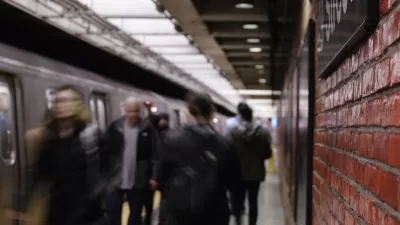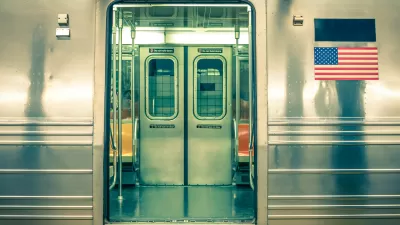After a shocking death and an overall rise in violent crime at its stations, New York City's transit authority will install platform barriers to prevent intentional or accidental falls onto tracks.

The New York MTA will test platform barriers at three of its stations. As Michael Gold and Ana Ley report, the move comes after one woman was pushed in front of a train at the Times Square station, which safety advocates argue could be avoided by installing the glass doors present in many other subway systems around the world. "The announcement comes as many New Yorkers have become anxious about safety on the subway, where the rates of violent crime per million weekday passengers have risen during the pandemic even as ridership has plunged, and where the number of people who end up on the tracks, most of them intentionally, is rising."
The barriers, also called platform edge doors or platform screen doors, block riders from accessing the tracks until a train has arrived. While the MTA has insisted that installing them in all of New York's subway stations isn't feasible due to "special complexities" and cost, the recent death of Michelle Alyssa Go, the woman who was pushed off a platform, prompted the agency to take up the issue once more. "Still, expanding the pilot would present significant financial and logistical challenges. The price tag for installing barriers at the 128 stations would be about $7 billion, according to the 2019 report [released by the MTA]."
In addition to the doors, the agency says it is exploring additional options for safety improvements that include cameras at the front of trains, increased police presence on platforms, thermal detection systems, and public service announcements that address mental health and warn riders away from the tracks.
FULL STORY: Subway Platform Barriers Will Be Tested at 3 N.Y.C. Stations

Montreal Mall to Become 6,000 Housing Units
Place Versailles will be transformed into a mixed-use complex over the next 25 years.

Planetizen Federal Action Tracker
A weekly monitor of how Trump’s orders and actions are impacting planners and planning in America.

DARTSpace Platform Streamlines Dallas TOD Application Process
The Dallas transit agency hopes a shorter permitting timeline will boost transit-oriented development around rail stations.

Interactive Map Reveals America's “Shade Deserts”
Launched by UCLA and American Forests to combat heat-related deaths, the tool maps the shade infrastructure for over 360 U.S. cities.

Bicycles and Books — In Sacramento, Libraries Now Offer Both
Adult library card holders can check out e-bikes and e-trikes for up to one week.

Colorado Landfills Emit as Much Pollution as 1M Cars
Landfills are the third-largest source of methane pollution in Colorado, after agriculture and fossil fuel extraction.
Urban Design for Planners 1: Software Tools
This six-course series explores essential urban design concepts using open source software and equips planners with the tools they need to participate fully in the urban design process.
Planning for Universal Design
Learn the tools for implementing Universal Design in planning regulations.
City of Mt Shasta
City of Camden Redevelopment Agency
City of Astoria
Transportation Research & Education Center (TREC) at Portland State University
City of Camden Redevelopment Agency
Municipality of Princeton (NJ)
Regional Transportation Commission of Southern Nevada





























